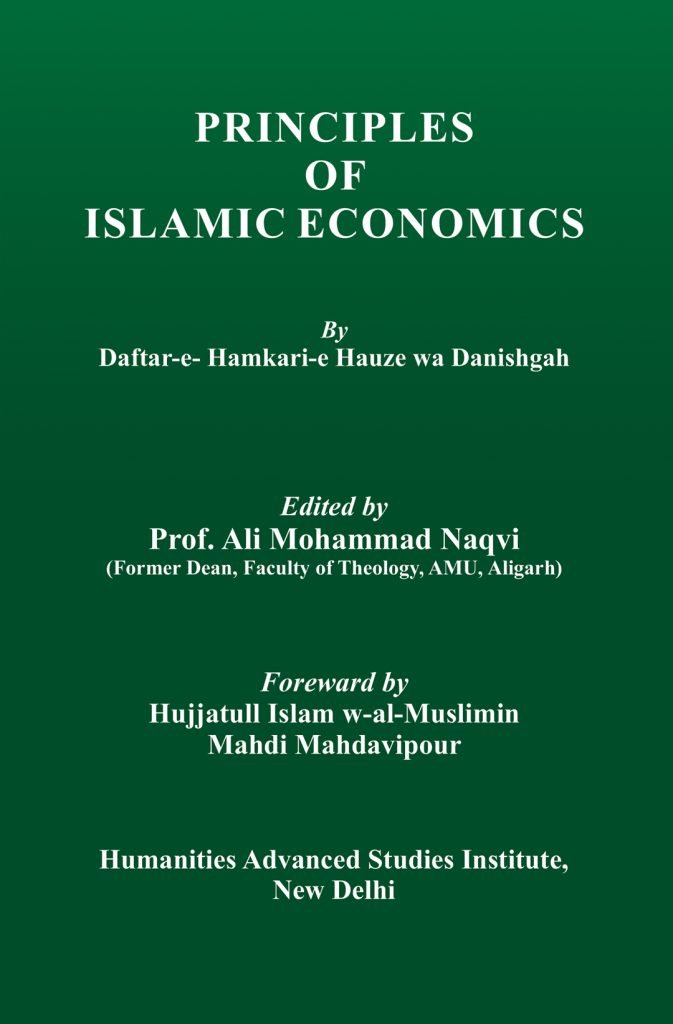
Author: Daftar e Houza w Dānishgāh
Edition: First
Year of Publication: December 2023
Publisher: Humanities Advanced Studies Institute, New Delhi, India
Copies: 500
Price: Rs 200/-
Foreword
By Prof. M. Shah Waseem
- Introduces the significance of Islamic economics and its foundational principles.
Preface
- Provides an overview of the book’s goals and its relevance to modern economic discussions from an Islamic perspective.
First Part: Introductory Discussion
Chapter 1: The Domain of Economics and Its Definitions
- Key Concepts: The scope of economics, its subject matter, and various definitions.
Chapter 2: Methods of Research in Economic Issues
- Methodology: The approach to studying economic phenomena.
- Ideal vs. Real Economic Models: Differences in understanding real phenomena versus ideal models in natural and human sciences.
The Role of Islamic Economic System:
- Identifying primary sources of the Islamic economic system.
Second Part: Discussion on Principles and Values of Islamic Economics
Introduction
- Lays the foundation for understanding core Islamic economic values and their application.
Chapter 3: The Basic Concepts of Islamic Economics
- Wealth in Islam: Understanding wealth as a social responsibility.
- Earning and Profit-making: Islam’s view on permissible earning and profits.
- Welfare & Scarcity: Islam’s emphasis on the welfare of society and addressing scarcity.
- Free Competition: Islam’s approach to competition and ethical behavior.
Chapter 4: Economic Man
- Western vs. Islamic Views: Contrasting the economic man in Western economics with the Islamic perspective on human behavior.
Chapter 5: Goals of Islamic Economics
- Key Goals:
- Social Justice: Ensuring equality and fairness.
- Poverty Alleviation: Addressing economic disparities.
- Wealth Distribution: Preventing the concentration of wealth and fostering economic independence.
Chapter 6: Economic Liberalism
- Philosophical Liberalism: A critique of liberal economic models.
- Islamic Economic Freedom: Defining economic freedom in Islam and its divergence from capitalist views.
Chapter 7: Social Justice
- Sources of Inequality: Addressing economic inequalities from an Islamic perspective.
- Distribution of Wealth: Methods for achieving equitable wealth distribution in Islam.
Third Part: The Legal Foundations of Islamic Economics
Chapter 8: Ownership in Islam
- Ownership Definitions: The Islamic view of property rights and their implications for society.
- Types of Ownership: Distinguishing between personal, communal, and state ownership.
Chapter 9: Legal Foundations of Income Distribution
- Income Distribution: Legal principles governing the fair distribution of wealth.
Chapter 10: Legal Foundations of Consumption
- Islamic Consumption Ethics: The limits and desirability of consumption, emphasizing moderation and avoiding wastefulness.
Fourth Part: Private and Public Sector in Islamic Economics
Chapter 11: Nature, Duties, and Powers of the Islamic State
- Role of the State: Defining the state’s responsibility in economic matters and ensuring justice.
Chapter 12: Financial Sources of the Islamic State
- Taxation in Islam: Analyzing Zakat, Khums, and other Islamic taxes.
- Khums: The collection and distribution of Khums, emphasizing economic justice.
Chapter 13: Government Policies in the Public Sector
- Islamic Economic Policies: Formulating policies that align with Islamic principles, focusing on comprehensiveness and justice.
Bibliography
- A comprehensive list of sources and references for further reading.
This summary distills the core principles and values of Islamic economics as laid out in the book, with special emphasis on its ethical foundations, the role of the state, and the methods for achieving social justice and economic balance.
